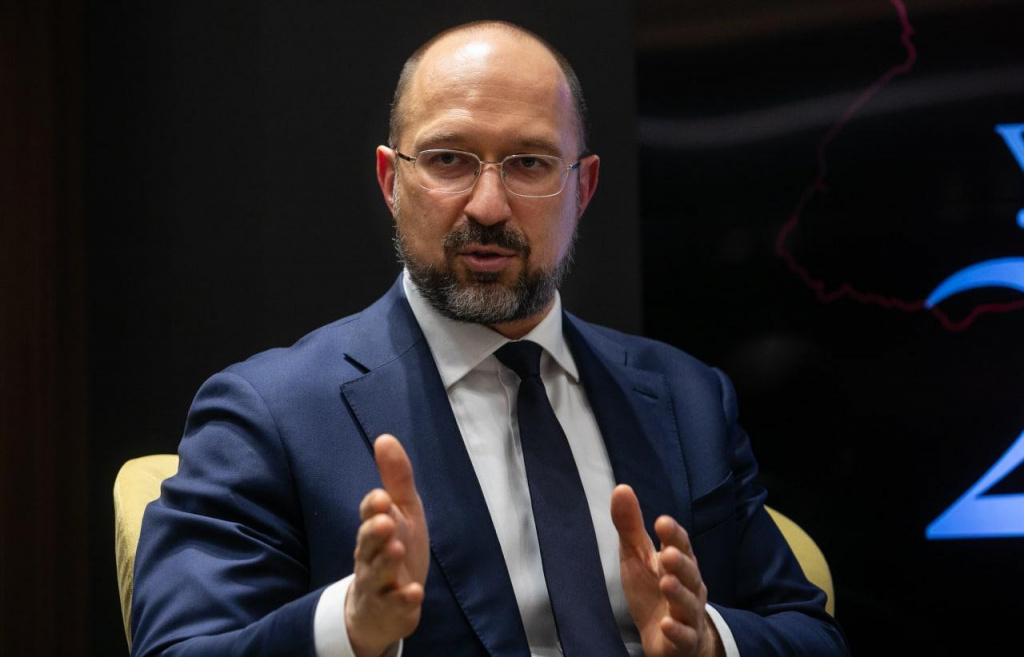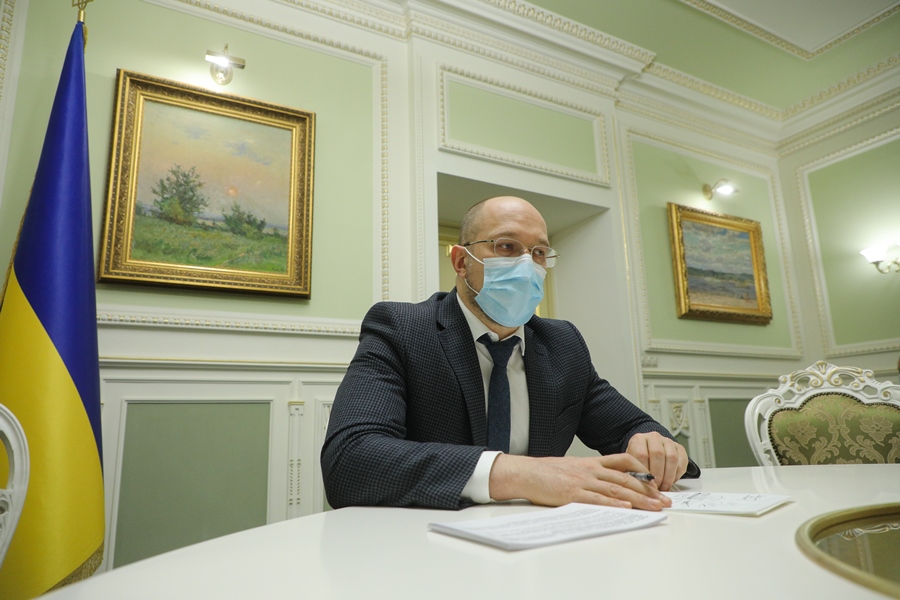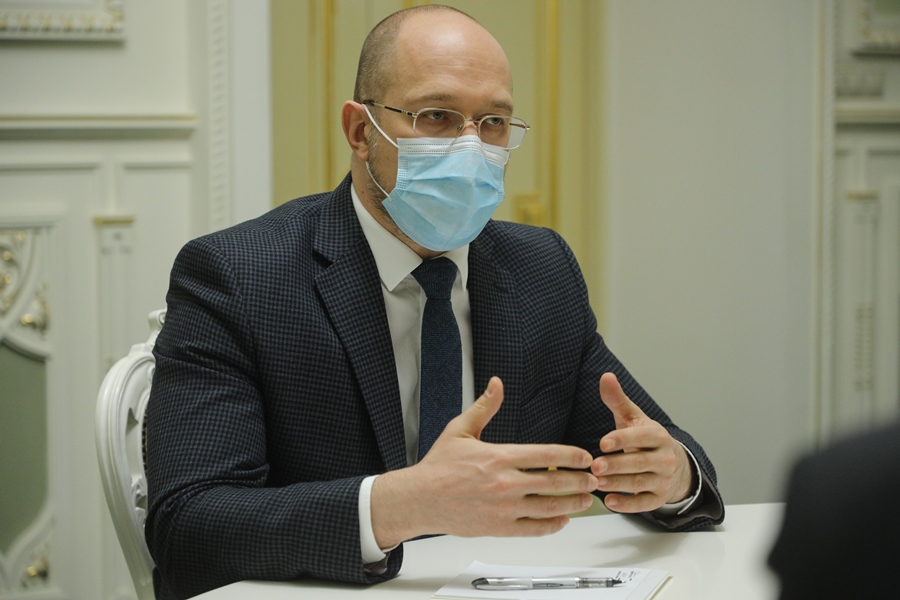Ukrainian Prime Minister Denys Shmyhal: Those in power must always face pressure from opposition – that’s democracy

Denys Shmyhal
Photo: Cabinet of Ministers of Ukraine press-office
Ukrainian Prime Minister Denys Shmyhal spoke in an interview with Interfax about how to protect household gas consumers amid growing market prices, the outlook for renewable energy and expectations from American partners on the eve of Joe Biden’s inauguration.
Question: What actions is the government leaning toward in regard to reducing or curbing the growth of prices for gas, electricity, heat and water for household consumers?
Answer: We have a free market for gas, including for household consumers, so the price is set by the market. Any market in any country is seasonal – in the summer gas is cheap because consumption decreases, and in winter it goes up in price because demand grows. We stand by the principles that we have a gas market, we won’t retreat from this. We won’t return to mechanisms where the state company was saddled with the social obligation to supply gas to household consumers at a reduced, nonmarket price and some rate was set by the state. This was not fair and carried high corruption risks.
Unfortunately, the market in Ukraine is fairly young and not quite balanced. There are certain distortions. Specifically, there are large companies that have a monopoly position in certain areas. These are regional gas companies that have 88% of the gas market for household consumers. This is why there was a distortion in prices, when state company Naftogaz sells gas for household consumers in January at UAH7.22 in one region, and there are regions where the price is more than UAH10. Accordingly, if nothing is done with the growth of gas prices on exchanges, including on the Ukrainian one, the price for consumers will be too high. They aren’t prepared to pay such a price. Therefore, even market mechanisms presume state intervention in order to protect the household consumer. Of course, there could be the product of a monetary subsidy in order to protect vulnerable consumers, but this product is long, it requires time, registration, determining the correct parameters of the recipient. This product, unfortunately, can work incorrectly on a market where there are companies with a dominant position. There could be a situation where with the subsidy the state will pay an inflated price to those who abuse.
Therefore, the government decided to impose an upper price cap. Not regulation, not social security law, not setting rates. The government stipulated that one can trade in these conditions at a price of no more than UAH6.99 per cubic meter. If the price on the markets begins to fall, it can move freely within these boundaries. For the record, UAH6.99 per cubic meter is the lowest price on the Ukrainian exchange as of January. We will pass a resolution in which we will stipulate February-March, and if necessary we will either continue this until the end of the heating season or the end of the quarantine, or prices will go done in March due to the seasonal factor and state regulation will essentially end with this, we’ll cancel the upper price cap.
Q.: How did negotiations with the IMF go? Do you have reason to believe that you will manage to persuade our partners that these measures are temporary and necessary?
A.: All these arguments were presented to the IMF a few days ago in our conversation with them. In addition to everything listed above, I want to point out that we have two options. Namely, a monthly product by default, where we don’t know what price we will see in the next month. This product turned out to be not very convenient for the young Ukrainian market, where consumers are used to a fixed rate. Therefore, we will now talk to the IMF in order to make the option of an annual product the default. These arguments were also accepted by the fund. Naftogaz also talked to them and assured them that there is no imposition of special obligations and that we are not using nonmarket mechanisms. So I think that our cooperation is absolutely constructive. Of course, they will expect the release of a final document in order to make sure that we are really not returning to price regulation. I am confident that the IMF mission will conclude its work in Ukraine and we will move forward with them as planned.
Q.: If regional gas companies refuse to supply at this price, can Naftogaz, as supplier of last resort, handle so many customers? There won’t be a situation where people will simply be left without gas?
A.: No, this is not possible. These things are regulated by the law. Naftogaz is prepared for such situations. In other words, if someone refuses to supply at this price, Naftogaz, as supplier of last resort, will supply gas to people at UAH6.99.
Q.: Are you feeling any pressure from certain members of parliament regarding the expenditures of regional gas companies? How justified are the current protests, in your view?
A.: We understand that there are actions that arose spontaneously and then were seized upon by certain political forces. We understand what the nature of these protests was and what their continuation will be. This situation happened due to some unfairness in the rate for gas distribution, which sometimes varies considerably. We sorted out this situation, held all the relevant meetings with the National Energy and Utilities Regulatory Commission. We understand how to resolve this at the legislative level. We will come out with an initiative together with the relevant committee in order to resolve these distortions. The weighted average price across Ukraine is currently UAH1.11, which is approximately the average figure for the fair cost of gas distribution in Ukraine.
Q.: Regarding the situation on the energy market, both gas and electricity, discussions sometimes arise that we have cheap electricity and gas resources in the north. What is the government’s position on the conditions for using these resources?
A.: There are currently no discussions at the level of the government, neither in political or economic terms, regarding direct imports of Russian product, electricity or gas. With Belarus, unfortunately, at the legislative level, we don’t have such a law that would regulate all these issues. Importing electricity from Belarus is technically possible, there are no restrictions, we have the relevant capacity, 900 MW, and if necessary Ukraine can import. Our power grids compliment one another, so this option remains open. As for political practicability, that’s a completely different question that hasn’t been raised yet.
Q.: There was talk not too long ago about rolling blackouts. How likely are such outages?
A.: I’m confident that Ukraine’s energy system will get through the drop in temperature smoothly. There is every reason for this. The only difficulty that the energy system is having at the moment is low stocks of coal at the warehouses of thermal power plants. In light of this, meetings were held, decisions were made. If need be, oil and gas fired units will be launched, and coal units will be switched to burning gas. In other words, everyone is prepared for this. The necessary additional amount of coal is being imported into Ukraine, including from Kazakhstan and other countries. In addition, the coal industry is increasing production and the necessary amount of coal is being raised to the surface.
The only thing is that there’s some inertia. When warehouses were full, coal mines suspended or reduced production, and now they’re starting to work at full capacity. But this will take some time. The shifting of repair programs for certain units, including nuclear ones, plus the cold snap – the growth in demand for electricity – led to the fast, unexpected depletion of coal at warehouses. And when there’s no coal in the pipeline, launching this process takes time. So this plus or minus two to three week gap arose that led to there being an insufficient amount of coal at warehouses. But not critical. Energoatom launched one of its units January 15 and going forward, literally in days, a second unit is being launched. Essentially, these parameters give us confidence that we should not and will not resort to rolling blackouts as a mechanism to balance the energy system, so I want to assure everyone that the situation is not easy, but it’s not critically difficult either.

Photo: Interfax-Ukraine
Q.: The issue of what to do with the money that Ukrenergo received under state guarantees – pay off debts to renewable energy producers or give it to Energoatom – is now being decided. What is the government’s position on whom it is prepared to help get through the winter?
A.: As regards Ukrenergo and lending under state guarantees, indeed, contracts have been signed and funds in the amount of UAH10.3 billion have been allocated to pay off debts of previous periods. We have two areas where we need to pay off the debts of last year and the year before last. These are debts to Energoatom for saddling it with obligation to provide electricity to households, so as to supply people with electricity at a price close to zero and keep the rate at UAH1.68/kWh. Accordingly, the necessary amount for Energoatom for the first quarter on debts from previous periods amounts to about UAH7 billion given the minimum necessary UAH5 billion for them to smoothly get through the first quarter with the fulfillment of the repair program, with the fulfillment of the social obligations put on them to the people of Ukraine.
We also have another area, which is debt to so-called green energy. We want our energy on the horizon to 2050 to be increasingly green, to not harm the health of people and the country’s environment. Accordingly, there’s a lot of debt there. There’s a signed memorandum under which repayment of debts is supposed to amount to about UAH9 billion to green energy literally at the beginning of this year.
Since Energoatom is the nuclear and energy security of the nation, of course they need to be supported, given some priority. Of course, the fulfillment of the memorandum with green energy producers is also a priority. This is our image, the development of the energy market, the trust of investors. In other words, these are important parameters both there and there. Given that there’s an agreement with the IMF and the budget allows for the possibility of issuing so-called green bonds in the course of 2021, we’re confident that we will now begin to do all this quickly.
Therefore, the preliminary decision, which is supposed to be made by SE Guaranteed Buyer, is to split the proceeds from the bonds 50-50. It comes to a little more than 5 billion rubles each for Energoatom and green producers. This is a preliminary decision, we have time to discuss it with both participants, hold consultations again about how we will pay off the other debts. But it’s clear that this is the right decision, so as to support Energoatom, so as to ensure its absolutely stable, uninterrupted operation, and at the same time support green producers, guaranteeing them speedy repayment of debts. Let’s call this decision balanced, a compromise decision for the distribution of these borrowed funds. Of course, this differs from the agreements we also had with banking institutions, but we held consultations and virtually everyone understands the importance of such a distribution.
Q.: Will Energoatom get a permanent chief executive?
A.: There is a development strategy for Energoatom. Literally a few days ago we held a meeting and presented it to the president. There is a vision to put Energoatom under the management of the Cabinet of Ministers, but the formulation of policy and operational coordination of work will in any case remain with the Energy Ministry. The goal of carrying out the president’s order to put Energoatom under the management of the government is the further corporatization of the company along the lines of Naftogaz. We need to create the right conditions for its transformation into a national joint-stock company, the establishment of a supervisory board, the establishment of a management board. All this is the strategy to increase Energoatom’s efficiency. I want to point out that its reorganization into a state joint-stock company does not mean its privatization, we’re not talking about this at all.
Q.: Will the transfer of Energoatom to you make it possible for the Energy Ministry to get back Ukrenergo?
A.: Yes, under the EU’s Third Energy Package, to avoid a conflict of interests, the manager of operators and regulators cannot manage generation. Accordingly, we can hand generation over to the Cabinet, and then all operators and regulators can be concentrated under the coordination of the Energy Ministry. In that case, the Energy Ministry becomes the formulator of policy, coordinator and operator of the energy market, while generation is corporatized and managed as a state business.
Q.: Large loans at the end of last year led to the growth of domestic government bond yields. Does the budget also call for record domestic borrowing this year? What will the government do to maintain low lending rates?
A.: At the end of last year we did indeed face a liquidity deficit. We took measures, created a schedule to raise funds, held meetings every day and coordinated this activity. This enabled us to meet absolutely all government obligations. We entered 2021 with a very good reserve of liquidity, we fully see that the first quarter is covered with both forex and hryvnia in the treasury account. We are very calmly awaiting the conclusion of the mission’s work and negotiations with the IMF regarding the tranche. As for the myth that domestic government bond yields rose, I want to say that in the second last week of the year we raised UAH51 billion in one day at one auction, including foreign currency bonds, and they were the cheapest in the whole history of forex international bonds – 6.2% annually for five years. Therefore, I assure you that the debt portfolio we have today, that was achieved toward the end of the year is one of the longest and cheapest.
Q.: What is happening with the funded pension system? Despite your previous statements, it was not launched before 2021. What is the next deadline?
A.: We have developed the strategy for the introduction of the funded pension system with the Social Policy Ministry. We have discussed it and worked out all the nuances with the relevant committee of the Verkhovna Rada. Now this issue is in the legislative plane. The relevant bill has been prepared, we will ask members of parliament to pass it as soon as possible so that this funded pension system is launched this year. For me this is a personal KPI, I want to achieve it. Ukraine needs a funded pension system. I believe it is a crime against society, against the nation that a funded pension system was not created in thirty years of independence. This needs to be corrected.
Another crime, in my view, is the absence of a civilized stock market in Ukraine. There is a presentation prepared by the National Securities and Stock Market Commission together with USAID, the EBRD and the American Chamber of Commerce. They’re prepared to allocate financing. There is a huge amount of work to do. A memorandum will be signed soon, after which we’ll begin to implement it. We want a decent stock market to start working in a year…But there’s a mass of legislative work. Therefore, taking into account all the nuances of bureaucracy, three years might be needed for full-fledged operation.

Photo: Interfax-Ukraine
A.: I don’t think it’s worth talking about a change of government or changes within the government. Of course, the replacement of the government itself is the prerogative of parliament and the president. As for the replacement of members of the government team, I always say that in time everyone concludes their term in a given office. So when this time comes, we’ll talk about it. Today it’s inappropriate to talk about this.
Q.: Are you prepared for possible attacks on the government by the opposition?
A.: The job of the opposition is to always fight for power. Therefore, those in power are always and should be under pressure from the opposition, this is the principle of democracy. Of course, this is inconvenient, sometimes it seems that this prevents us from working effectively. But this political component brings its own evolutionary component to the country’s progress.
Q.: Our interview is coming out just before the inauguration of Joe Biden. How important to Ukraine is economic cooperation with the United States, and what do you expect from our American partners in future?
A.: The United States is the world’s leading economy and one of the largest democracies. We have extremely good and close relations with them, not only as regards work with the IMF, but also broad economic cooperation. There is also military cooperation and cooperation in the area of reforms. We have a mass of projects with donor support through USAID. Therefore, certainly, the U.S. is an important, top partner for Ukraine.

